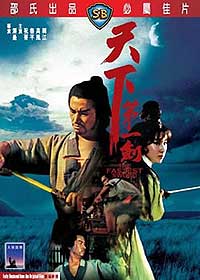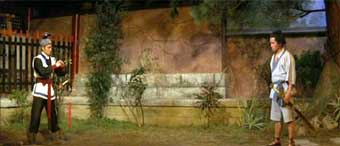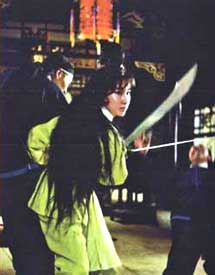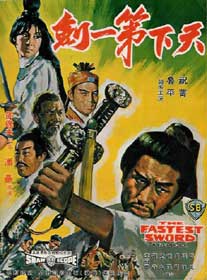 Taking its main cues from Henri King's classic American western The Gunfighter (1950), we have the rarest of wuxia in The Fastest Sword (Tian xia di yi jian, 1968), a tale of character instead of nothing but swordplay. Taking its main cues from Henri King's classic American western The Gunfighter (1950), we have the rarest of wuxia in The Fastest Sword (Tian xia di yi jian, 1968), a tale of character instead of nothing but swordplay.
Director Lei Pan also wrote the script, & as he had a career in literature before he was a director, he ended up with a script far above the norm. The comparison to The Gunfighter has been exaggerated as Lei Pan makes so many original changes that it is not an imitative work, & if it is imitative at times, it is in following the cinematic methods of a Kurosawa or a John Ford instead of the leading directors of predictable wuxia.
Going for something a lot more intelligent does not mean disappointing action fans; it's got loads of swordplay. But the central protagonist is so well drawn & played with such depth, everything that happens to him really matters, whether its a big event or a small one, a passing thought seen in his glance, or yet another brush with death. Story-wise The Fastest sword has to be compared to Kurosawa or Kobayashi samurai fiction, not the typical comic book extravaganza with a whole lot more fight than sense.
Elegant yet well-worn & real costumes & fabulous swordplay are superior throughout. The only visual fault of The Fastest Sword would be the heavy make-up making the otherwise attractive warriors look a bit drag-queenish. But once the viewer adjusts to the overdone make-up design, what we find ourselves in is one of the most dramatic sword tales ever committed to the screen.
Our hero has the title "Swiftest Sword Under Heaven" though in practical terms it means only that he is "The Swiftest Southern Sword" & it is assumed that only "The Swiftest Northern Sword" who duels at the opposite end of China could ever be his equal.
Other swordsmen desire to win this title, so he is persistently challenged by would-be up-&-comers. He is a man without feeling or sentiment & when challenged, kills his opponents with great ease, whether or not it is necessary.
Ding Menghau the Southern Sword is played by Ping Liu, one of the biggest leading men of this film era. He was a top tough guy player of the "San Chuan Bau" type, essentially meaning "Toshiro Mifune style of machismo."
 A wizened hairy old hermit (Lu Wei/Liu Wai) admires Ding Menghau's speed & skill, but not his eagerness to kill. A wizened hairy old hermit (Lu Wei/Liu Wai) admires Ding Menghau's speed & skill, but not his eagerness to kill.
He makes a deal with the wild young swordsman: If Ding can be defeated by the old man, who is armed only with a long smoking pipe, then the young man must stay with the hermit for three years, obedient at all times.
The swift young swordsman agrees but only if the octogenarian will be his servant once the long smoking-pipe is overcome.
Of course he's roundly defeated with one quick motion of the pipe, & finds himself reduced to the status of an old man's servant.
The hermit lives an unpresuming life of contemplation. His annoyed young servant becomes increasingly bored. He's put to work copying secret books, which task he does not enjoy any more than he enjoyed sitting still & mediating. His master is putting him through an educational process whether he likes it or not or even knows it.
This is a beautiful story, so much more character driven & remarkable than nonstop kung fu action. And when the action does erupt, there's vastly more concern for the fate of characters.
The labors of our hero have a fairy tale quality, as the master reshapes the cruel man into something greater than he had been. He'll spend the majority of his indentured servitude by himself, carving stones, & gain the practical skill of a stonecarver, besides becoming in the long run a refined artist.
When his service expires, Ding Menghao returns to the world of rapid swordplay. Now, however, it does not please him when duels result in the death of an opponent. He tries to befriend whoever wants to duel, but such men are apt to insist on bloodshed, not frienship. He tries to ignore them, but they are only insulted & do not give up the pursuit. Others he tries to disarm without injury, but some just will not give up.
When an eighteen year old youth dies against Ding Menghao's only half-drawn sword, he's heartbroken at the pure stupidity of such acts. The elders of the village where he's been staying gather funds in order to bribe him into leaving. With tragic footstep, Ding becomes a wanderer.
 He's next found working as a stonecarver for the mason Da Fu, & himself goes by the name Brother Zhang to avoid challenges to duel & to kill. People are curious about him due to his reserve. Qing-erh Liu (Ching Chu/Jing Chuk), the martial daughter of the village elder, takes a particular interest in him, or romantic bent.
He's next found working as a stonecarver for the mason Da Fu, & himself goes by the name Brother Zhang to avoid challenges to duel & to kill. People are curious about him due to his reserve. Qing-erh Liu (Ching Chu/Jing Chuk), the martial daughter of the village elder, takes a particular interest in him, or romantic bent.
A gang of bandits raids the town, killing randomly as they go. Ding's employer Da Fu is scared stiff, but Ding as "Brother Zhang" remains aloof & calm. Qing-erh rushes forth to defend her father with her swordskill. All this while, Brother Zhang sits before a piece of stone, carving a statue & doing nothing about the bandits.
One of the robbers thought he recognized the stonecarver as Ding Menghao the Southern Sword, who went missing many months before. So they robbed every house but the one he stayed in, knowing they'd all die if it was who they suspected. Yet the stonecarver never drew his sword, & if he was not the Southern Sword, the bandits wouldn't have to think twice about their planned intent of long term terror against the village.
Chief Bi of the Golden Sword Clan not long after arrives in the village following the rumor of the Southern Sword living there as a humble stonecarver. Circumstances won't let Menghao hide from his fate as a killer, as this is the father of the eighteen year old youth Ding was so sorrowful to have slain. Looking as downcast as is humanly possible to be, he goes to face Chief Bi on the edge of town.
Pleading not to be forced to draw his sword, he lets Chief Bi beat him with a bullwhip. Chief Bi is enraged by the prospect of being refused his just vengeance. He finally agrees to spare Ding Menghao, but if if he is allowed to cut off his sword arm. Ding agrees. Fortunately, a mysterious swordsman interfers before Ding/Zhang loses his arm.
The mysterious stranger is Qiu Yixing, the Northern Sword (Ming Go), baring the title of fast swordsman in his kingdom. Having no other equal in China, he has long been on a quest to find the Southern Sword. He does not yet know for certain that Brother Zhang Xin is in fact Ding Menghao, though he has his suspicion.
Qiu Yixing is a good man who takes an instant liking to Zhang. It would obviously be a pity if either man should die. Zhang/Ding tells him, "I have sworn never to draw my sword." But Brother Qiu will not give up his dream of knowing which of them is the fast sword in the world.
The Northern Swordsman is convinced his life would be meaningless without the duel to settle who is greatest, whereas Ding has come to believe life is too meaningful to end it for sake of vanity, & does not want to kill a man who should be a friend.
Master Centipede, leader of the bandits, is a hulking axe fighter who has a longstanding grudge against the Liu family, & intended to terrorize the village out of existence in his thirst for vengeance. For sake of Miss Liu, Zhang may have to become Ding Menghau once again, to end the banditry once & for all.
Miss Liu & her father are fighting for their lives & doing well, but there are just too many bandits. Ding Menghau arrives to eviscerate Master Centipede. He & Qiu side by side save the village & athe Liu family. But now Ding Menghao has broken his oath never to draw sword, & is beholden to Qiu for the one duel he so greatly desires.
This is one of the great moments in all wuxia cinema, as we want both men somehow to survive, though it hardly seems possible. Heroism & suspense comingle at their height.
Their duel inside the temple is brilliantly staged between two beautiful, skillful men, true tigers of ferocity. "Brother Ding! I want to learn from you!" cries the ferocious Qiu. Ding fights with sheathed sword, still unwilling to kill a man he admires. When at last his sword is drawn, the surprises have just begun.
This duel is both psychological & very, very physical -- one of cinema's great pieces of sword play, with Ding's face sorrowful & horrified through every moment. There are long shots, no cheating quick-edits such as are required to disguise the lack of swordskills for too many actors. A long single shot in slow motion allows the closest scrutiny of a battle terrifying in its realism.
I shan't reveal the end, which is simply incredible. I weary of magic flying kung fu heros & when a film of this much power treats swordsmen as men who existed in the world rather than only in comic books & movies, it's just so much more rewarding a filmic experience. A beautiful, beautiful film.
copyright © by Paghat the Ratgirl
|

